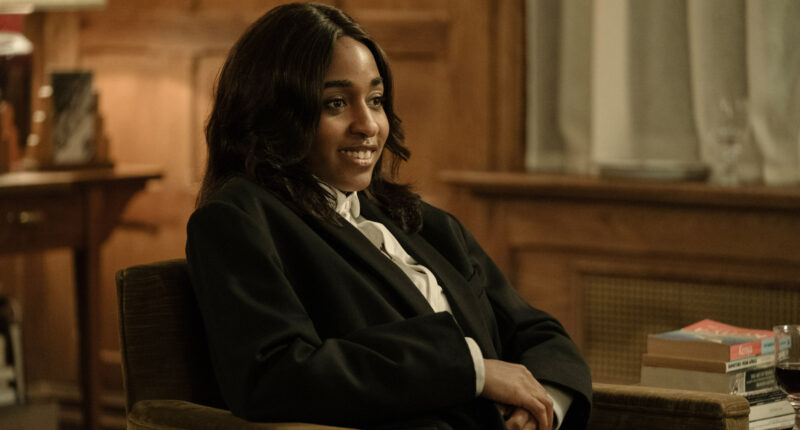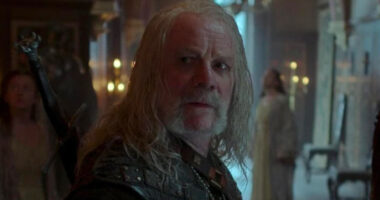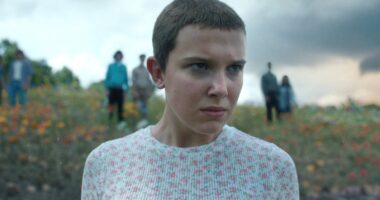Share this @internewscast.com
Contains spoilers for “After the Hunt” and discussion of sensitive content, including sexual assault and substance abuse.
Luca Guadagnino has his plate full. His 2024 releases include the tennis-themed love triangle drama “Challengers” and a William Burroughs adaptation titled “Queer.” Additionally, he’s working on a variety of projects, such as the biopic “Artificial” centered on Sam Altman and an “American Psycho” remake, though he’s no longer attached to DC Universe’s “Sgt. Rock.” His #MeToo drama, “After the Hunt,” is now hitting theaters, featuring Julia Roberts, Ayo Edebiri, and Andrew Garfield. The film explores a provocative “he said, she said” narrative intertwined with intergenerational academic conflicts.
The film received mixed to negative reactions from premiers at the Venice and the New York Film Festivals, with its ending—potentially its multiple endings—being a central focus of critique. Scenes from the conclusion are bound to spark debate, sometimes for unintended reasons by the creators. Some critics even suggest the film’s conclusion opts for safety over discomfort, despite its intent to challenge and confront. This article explores the final moments of “After the Hunt,” interprets the open-ended questions raised by the movie, and shares insights from the cast and crew regarding its intriguing epilogue.
What you need to remember about the plot of After the Hunt
Taking place in 2019, “After the Hunt” follows Yale philosophy professor Alma Imhoff (played by Julia Roberts) amid her tenure pursuit. She faces a dilemma when student Maggie Resnick (Ayo Edebiri) accuses Professor Hank Gibson (Andrew Garfield) of sexual assault after a party at Alma’s house. Maggie, who has a deep infatuation with Alma bordering on obsession, confides in her post-incident with ambiguous claims about Hank crossing boundaries, clearly distressed by the encounter.
While Maggie wishes to publicly disclose her story and take legal action against Hank, Alma advises staying low-key. Hank—whom Alma finds more attractive than her own husband Frederick (Michael Stuhlbarg)—denies the accusations, suggesting Maggie plotted against him after he caught her plagiarizing. Subsequently, the university terminates Hank, prompting him to wreak havoc as he exits.
Alma is entangled in substance dependency, falsifying prescriptions using documents pilfered from Dr. Kim Sayers (Chlöe Sevigny), the school psychologist. This discovery ruins her tenure prospects. Meanwhile, Maggie has a habit of snatching things, like a German newspaper article about a withdrawn rape claim she took at the party. She sees this as a parallel to Alma’s past trauma, but Alma grows distant. Maggie’s interview with Rolling Stone highlights Alma’s lack of support.
What happened at the end of After the Hunt?
Post-termination, Hank is residing in Alma’s spare apartment using a key she forgot he had. When Alma seeks solitude there, they discuss the incident. Alma agrees Maggie plagiarized but hesitated to discipline a Black queer student with influential parents and media ties. Returning to the assault allegations, Alma admits Hank could have dated students despite not being a rapist. Hank fiercely denies this, refuses to apologize, then tries to initiate sex with Alma, ignoring her objections to stop.
Being confronted by student protesters on campus, Alma faints and is sent to the hospital for an ulcer. While she’s there, she talks with Frederick about the relationship she had as a teenager with one of her dad’s friends in Germany. Alma characterizes the relationship, which began when she was 15, as a “romance” and not grooming or rape. She claims she only charged him because she was jealous of his new, more age-appropriate partner, and later recanted as that newspaper clipping showed. But she feels immense guilt over her accusations playing a role in his later suicide. Frederick assures her it wasn’t her fault — she was a child, and the adult should have known to say no.
The final scene of “After the Hunt” takes place five years later, with news headlines about the California wildfires and Facebook ending DEI programs situating us in 2025. Alma and Maggie meet at a diner, having made amends with each other and both discussing how they’ve matured and are doing well. The last line of the film is director Luca Guadagnino saying “Cut!” off-screen.
Is Hank guilty of sexual assault?
“After the Hunt” never directly confirms what happened between Hank and Maggie in the story’s inciting incident, and there are details in the film that might make the viewer question Maggie early on. The way she avoids direct language about the “line” Hank crossed allows for some plausible deniability, and Dr. Sayers’ analysis — that Maggie was telling the truth about feeling violated by Hank, even if the violation was purely about power differentials and not anything violent — could make an easy out for how Maggie’s and Hank’s accounts could both be true in their own ways.
After the sequence in the apartment during the film’s final act, however, it’s hard not to believe the absolute worst about Hank. He can yell all he wants about how he never acted inappropriately with students beyond “flirting” and that the only person at Yale he ever wanted to have sex with was Alma, but that doesn’t change the fact we see him come perilously close to raping Alma. Even if we don’t have definitive evidence of how far he went in his inappropriate interactions with Maggie, the fact that he’s shown a pattern of not taking no for an answer makes it impossible to defend him in the end.
Is Maggie guilty of plagiarism?
While the accusation Hank makes against Maggie is far less serious than the one she makes against him, it appears that both accusations are true. Alma agrees with Hank that Maggie’s paper on virtue ethics is obviously plagiarized, and without any evidence to the contrary presented, the viewer has no reason not to believe their shared assessment. In “After the Hunt,” everyone is guilty of something — with the possible exception of Frederick, the one likable character in the whole movie.
But should we have to just take Alma’s word on this issue? One of the movie’s big flaws is that Maggie’s characterization as a student isn’t fleshed out nearly enough, so much of our perspective on her is just taken from Alma’s judgments. As one minor example, we’re told by Alma that Maggie has nothing in common with her nonbinary partner Alex (Lio Mehiel) and is only dating them to appear more woke, but we barely actually see what their relationship is like, so it’s hard to say if Alma’s assessment is accurate. Perhaps the scenes of Maggie snooping around and stealing things are meant to imply how she got away with her plagiarism, but for the most part, we’re really only seeing her through Alma’s eyes.
Is the ending a response to Call Me by Your Name criticism?
A teenager actively pursues and engages in a sexual relationship with an adult man in Europe, only to feel heartbroken upon discovering that this man has another partner closer to his own age, and a loving figure played by Michael Stuhlbarg gives advice on processing these complicated emotions. This is a description of both Alma’s personal story in “After the Hunt” and the main story of Luca Guadagnino’s Oscar-winning 2017 film “Call Me by Your Name.”
The situations aren’t exactly identical. In the “After the Hunt” backstory, the teenager is a younger girl and the adult man is much older, making it a clear-cut case of grooming and abuse, where “Call Me by Your Name” is in a more ambiguous space that can still be enjoyed as a date night-friendly romantic fantasy. The parallels, however, suggest that Guadagnino has heard the criticisms of the age gap relationship in “Call Me by Your Name” and is looking to address those criticisms here. The hospital conversation in “After the Hunt” shows how trauma from grooming — and the way Alma has come to blame herself for what happened — continues to hurt people decades after it happens. Notably, this whole story is handled very differently in the final film than in Nora Garrett’s original script (more on that later).
What’s the purpose of the epilogue?
Even some critics who’ve come down more positively on “After the Hunt” overall have expressed confusion about what to make of the epilogue. For one thing, the movie already feels long, so adding yet another possible point where the story could end starts to feel like overkill. Then there’s the sudden tonal shift — showing Alma and Maggie fine and on good terms with one another five years after the main story might offer some sense of relief following so much anxiety, but not everyone wants that relief. One of Alma’s most memorable lines is “Not everything is supposed to make you feel comfortable,” so why did this movie need a cushion?
The strongest intellectual defense of the necessity of a five-years-later epilogue (if not of how it was executed) is that the culture “After the Hunt” was commenting on has changed so drastically that one has to acknowledge those changes. Maggie’s comments at the party about how the broader culture is only pretending to suddenly care about the marginalized in the #MeToo era ring extra true amidst the second Trump administration’s assaults on diversity in academia. Yet even the acknowledgement of those changes is just a small part of the epilogue, which largely wants to play more off Roberts’ and Edobiri’s screen chemistry to give them happy ending. Or, at least, the appearance of a happy ending — director Luca Guadagnino has discussed the possibility this ending isn’t as reconciliatory as it appears.
What the director and actors say about the ending?
When asked about the ending of “After the Hunt” at the 2025 New York Film Festival press conference, director Luca Guadagnino found the question “difficult” to answer because he wants the audience to make up their mind about it. His response offered a few possibilities about what to make of the epilogue. It could be about “false reconciliation” or “real reconciliation.” After Alma and Maggie spent the movie fighting over truth, Guadagnino offered that, after the passage of time, “they understand what one wanted from the other and the other way around, and what they got and what they lost, but what is always going to be at the center of their lives is capital.”
As for his final line of “Cut!,” the director had a more direct explanation: “Once we say ‘cut,’ we invite the audience to think that this is a movie and we wanted to entertain them.” He noted the ending was an homage to George Cukor’s final film, “Rich and Famous.”
Andrew Garfield compared the final line of “After the Hunt” and Puck’s speech to the audience at the end of “A Midsummer Night’s Dream.” He also brought up how Mark Rylance would end his Shakespeare performances at the Globe Theatre with a dance — “Hamlet’s dead and then he resuscitates and he does a dance at the end, and let the audience go from sobbing with catharsis to going ‘OK, that wasn’t real.'”
After the Hunt’s original ending
The original script for “After the Hunt” has been shared around the internet a lot over the past two years, and it’s striking just how different the script’s ending is compared to the movie. Major character choices have been completely flipped. In this older draft, Alma consents to sex with Hank (then named Henrik) in the apartment, and Henrik admits to lying about having claimed Maggie cheated on her paper. Perhaps the biggest change, however, is that the older draft treats Alma as having actually lied about her assault as opposed to having been a victim of grooming in denial.
While there’s no “five years later” epilogue, the script has its own excessive conclusion, with Alma going to the mother of the man who killed himself over her recanted accusation in hopes of making amends. Even those who loved the script found the ending pointless: ScriptShadow‘s otherwise glowing review states “There is no reason — and I mean NO REASON — for the last 10 pages of this script to exist.” As questionable as parts of the finished film’s ending are, it’s actually better than what it was originally going to be — instead of merely being controversial, it could have been in “worst movie ending of all time” territory.
If you or anyone you know needs help with addiction issues or has been a victim of sexual assault, contact the relevant resources below:
-
The Substance Abuse and Mental Health Services Administration website or contact SAMHSA’s National Helpline at 1-800-662-HELP (4357).
-
Visit the Rape, Abuse & Incest National Network website or contact RAINN’s National Helpline at 1-800-656-HOPE (4673).







